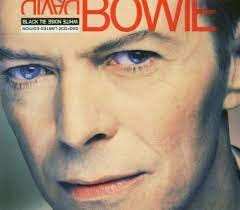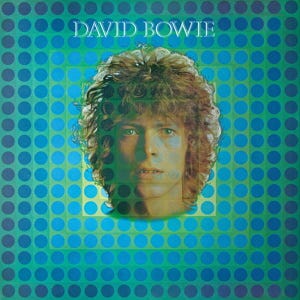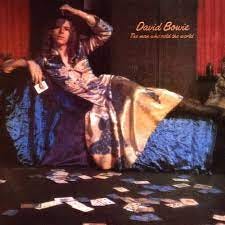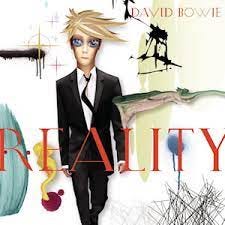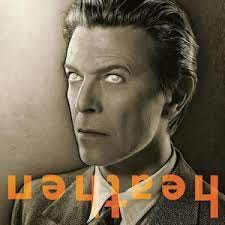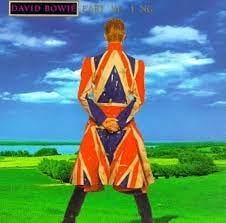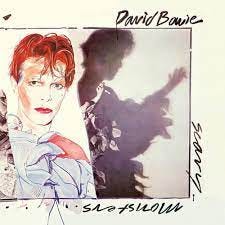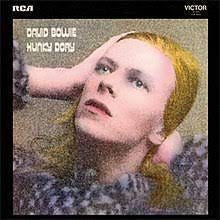The Bowie List: David Bowie's albums ranked from worst to best pt. 2
I think fame offered him a way out of himself, and gender-bending became a tool to escape the suffocation of disillusionment.
We’re skipping the intro this week! Let’s get right into it!
18. Black Tie White Noise (1993)
I initially wanted to place this album higher than where I have it because I feel like Black Tie White Noise generally has good-quality songs and utilizes a unique musical palette. But the more I thought about it, the more I felt I couldn’t justify placing BTWN higher than records like Heathen or Space Oddity, even if the record is more fun than the former and more consistent than the latter. Why is that? The first thing that came to my mind when I relistened to this album in preparation for this list was, that this album is weaponized datedness. Not only does this album feel completely absorbed in the time it came out, but it almost seems to embrace that feeling to the absolute limit. The most obvious example of that is on the title track. Regardless of the record being totally entrenched in the vibes and aesthetics of New Jack Swing, I think this record has some of Bowie’s most underrated performances, vocal and instrumental. Great examples of this are the album’s opener “The Wedding” and the song “You’ve Been Around”. If this record was a few tracks shorter I would put it higher, but as is, BTWN just doesn’t quite clear the halfway mark.
17. David Bowie (Space Oddity) (1969)
This album posed an interesting predicament for me as I constructed this list. That is: how much value does one incredible song give to an album? The song in question is the legendary “Space Oddity”. It might appear confusing at first to have two different self-titled albums being released back to back, but it starts making sense when you compare the two. David Bowie (Space Oddity) —I’m just going to refer to it as Space Oddity from here on out to avoid confusion—feels like Bowie hitting the reset button. Rather than trying to retread or reframe the tweeness of the ‘67 record, Space Oddity shows Bowie embracing influences from Folk-Rock and Psychedelia. Although this change of direction is quite refreshing, the album itself, save one song, is pretty derivative. Bowie’s delivery on this album reflects an air of weightiness which I theorize is Bowie trying to bring a Bob Dylan-esque heft to these songs. Unfortunately, I think these attempts mostly fall flat. Bowie is an actor, and his delivery reflects a theatrical state of mind. This approach contradicts the gritty Blues-Folk tradition Dylan is coming from. Nevertheless, I think this approach works in spades in the case of the song “Space Oddity”. If you’re aware of any Bowie songs, one of them needs to be this one. If you told me “Space Oddity” was the best song David Bowie ever wrote and performed, I don’t know if I could argue with you. Few songs have ever captured the consciousness of its time quite like this one. It spoke to the dreams, hopes and fears of the world as we entered headlong into the Space Age. The song details a fictional exchange between “Ground Control” and the Astronaut, “Major Tom” as he ultimately becomes lost in space. It’s a truly moving piece of Psychedelic Folk and a great indicator of the wonderful songwriting and storytelling to come. If you’re familiar, you know that the themes of “Space Oddity” and even the character of Major Tom would make sporadic returns throughout Bowie’s discography.
16. The Man Who Sold The World (1970)
The shift into the 70s was accompanied by a doubling down on the psychedelic. This led to heavier records and more far-out experimentation. It’s well documented at this point that Bowie’s goal at this time was to become famous, and although his breakout hit with “Space Oddity” had given him some chart success, he needed some to maintain that momentum. As a result, The Man Who Sold The World reflects a desire for relevance, musically mimicking the emergence of Heavy Metal which was happening simultaneously with Black Sabbath and Cream. TMWSTW nonetheless feels like an enormous step forward for Bowie, and a step forward for music in general too. I give this record credit for not only being an exceptional increase in quality for Bowie but also a milestone in Bowie’s creative, theatrical development. TMWSTW is, after all, the introduction of Gender and Sexuality as an important thematic device. I feel like we need to give Bowie more credit than that he just wanted to be famous for the sake of it. I think there’s a great deal more to it than that. I think Bowie was primarily concerned at the time with figuring out who he was and pushing the limits of what he could become. He felt restricted by inescapable societal norms and social constructs. I think fame offered him a way out of himself, and gender-bending became a tool to escape the suffocation of disillusionment. It shouldn’t be ignored that, perhaps because of their association with his near-fatal drug addiction, both fame and outward queerness faded into his past in his later years. However, it also shouldn’t be ignored how revolutionary his outward queerness was, and how powerful it was in connecting with an audience of misunderstood people. I consider this to be Bowie’s first great album, even if it wasn’t the breakout record he needed to maintain post- “Space Oddity” momentum. I think the record still stands the test of time, and we can thank Nirvana for breathing new life into the album’s title track during their MTV Unplugged performance.
15. Reality (2003)
It’s crazy that Reality is Bowie’s last album of the 00s. It’s a shame too, one can only imagine what genres and styles Bowie would have pulled from deeper into the decade. Even so, I still think there is a lot to appreciate here. Part of what makes Bowie such a phenomenal artist is that even at this stage in his career, Bowie is still taking a forward-thinking approach to songwriting and production. Before I get too ahead of myself talking about the music on this album—the elephant in the room—this album cover is hideous. I will argue that it’s not the worst album cover in Bowie’s discography (we will get to that one eventually), but it’s close. The best I can say for it is that it’s very postmodern, a word I like to throw around a lot when talking about Bowie, and it at least feels indicative of the ideas explored on Reality. Musically speaking, I hear a lot of similarities between Reality and Heathen from a year earlier. The main difference I see is that Reality feels more bright and spacey compared to the darker and melancholic Heathen. The production styles between the two are quite similar, both are Tony Visconti productions after all. For me, I slightly prefer Heathen. Both are solid Bowie records though.
14. Heathen (2002)
In the making of this list, one of the most difficult things has been trying to figure out a fair way to compare Bowie’s late-era work with what I’d consider to be his prime, the 70s output. This task wouldn’t be so difficult if Bowie hadn’t continued to experiment with his music as the years went on. So, I’ve given myself this seemingly impossible task of comparing apples with oranges. With albums like Tonight or Hours this task was relatively easy. This is because the difference in quality was far more apparent than the difference in genre. The only solution to this, I have found, has been to give greater credence to my personal preferences. So sure, both apple and orange in the case appear to be high quality, but I’m more often in the mood for oranges. Where does Heathen fit into this discussion? I will expand, because I think this also applies to some of the other “late-era” Projects. Reality, The Next Day and Heathen are all high-quality apples to me. I enjoy them. They sound fantastic. The songwriting is great. They represent Bowie’s unfailing commitment to artistry even as he was beginning to suffer more greatly from the obstacles of mortality. At the end of the day, I don’t find myself enjoying them quite as much as the 70s albums. I make this point because I don’t want to deter anyone from these albums, Heathen especially. One of my favorite things about Heathen is that it still feels like Bowie embodying a character, albeit in a more abstract sort of way. I see this as a key component in his greatest work, the ability to step outside himself, and thus uncover a portion of his identity. In the case of Heathen, that character is brilliantly bitter and malevolently melancholic.
13. Earthling (1997)
I’m ready to face all criticisms that I’ve placed Earthling way too high on this list. Although I kind of understand why people don’t like this album, or consider it a dud in Bowie’s discography, I can’t find myself relating. Also, to anyone considering placing Earthlin in the running for worst album cover: You’re wrong. Plain and simple. This album cover rules. So, you might be wondering, especially if you’re not familiar with this album, what is it that people don’t like about this album? Well for one, it’s a Jungle/Industrial Pop album. It’s not something we’ve come to expect from Bowie, nor would he ever return to the sound. I’m personally a huge fan of Jungle, and the Nine Inch Nails influence on this album is a huge plus. That’s not where the strength of this album comes from though. I think the true greatness of this record lies in the songs themselves. Behind the wild, bouncy electronic instrumentation is a collection of truly great songs. I became convinced of this when I saw a video of Bowie performing an acoustic version of “Dead Man Walking” live on Conan. Don’t get the wrong idea though, these aren’t great songs hiding beneath an Industrial Pop veneer, the blasting beats give these songs a very fun and unique character, making Earthling a one-of-a-kind album experience that I wish was longer. Even though some obvious inspiration from other artists is being pulled from for this album, I don’t think there is a record out there that quite sounds like Earthling. And how I wish there was!
12. Scary Monsters And Super Creeps (1980)
The through-line from Lodger to this album is very direct, and I can’t help but feel Scary Monsters (And Super Creeps) is the truer realization of the things Bowie was cooking up at the time. I feel it would be safe to say, Scary Monsters is every bit as artsy and unique as Lodger, but with 10 times the consistency. Furthermore, this album just kinda feels like everything someone might want in a Bowie album, (not me, otherwise I would have placed it higher…) The main thing that I think turns me off to this album is that it feels more beholden to aesthetics than any other Bowie album. I think many might say that’s sort of the point. The New Romantics counter-cultural movement was well on its way in Britain, and Bowie was lending himself to the cause. Integral to the movement was a particularly artful androgyny, characterized by heavy makeup and near clown-like exaggerated fashion. Musically, Scary Monsters also points to many of the musical motifs that would make up the British New Wave, colorful synths and bright reverberated melodies. A real standout for this album is the song, “Ashes to Ashes” which calls back to the character of Major Tom. “Ashes to ashes, funk to funky, we know Major Tom’s a junky”. Something that might not have been clear when we first heard “Space Oddity” is that Major Tom is more than just a character, he symbolizes a part of Bowie himself. Not only does this song add to the Bowie canon, it also expands the meaning of Major Tom and does something Bowie rarely does: explicitly point to his personal experiences in the song. I find it fascinating that we seem to gain a better idea of who Bowie is through the fictional characters he presents himself as in his music. Thus we see the mysterious distinction between truth and reality.
11. The Next Day (2013)
Another potential candidate for the worst album cover contest. To be fair, I actually quite like the album cover for The Next Day. Bowie’s first musical entry for the 2010s, The Next Day was quite a revolutionary musical statement for Bowie as his first explicitly reflective album. After experiencing health problems in the 2000s which led to a sudden halt in live performances and musical output, it makes sense that Bowie would return with an album exploring his musical past. I think The Next Day is one of Bowie’s most underrated albums, and I can point to a few reasons why. For one, a deliberate “return to form” makes The Next Day struggle to stand out within the context of the catalog. Obviously, no one is going to choose this record over Station to Station or The Rise and Fall of Ziggy Stardust and the Spiders From Mars. However, I believe many of these songs deserve to stand toe-to-toe with many of the songs of those eras. In particular, “The Stars (Are Out Tonight)” and “Valentine’s Day”. The first is a wonderfully dreamy number that feels like a modern take on the Berlin era, and the second is a painfully beautiful critique of American gun culture. The other major reason I think The Next Day is often overlooked is because of the album that followed it, 2016’s Blackstar. Whereas Blackstar is a gut-wrenching vision of Bowie staring deep and fearfully into the abyss of death, The Next Day is a celebration of an artist’s life. I don’t want you to misunderstand me though. As reflective as The Next Day is, it still sounds like a record that was recorded more contemporarily. I think the work Bowie and Visconti did here on the production is a true feat. They were able to create a timeless record, both tied to the past, but living in an amorphous future. As sad as listening to Blackstar is for me, (and I will go more into that later), The Next Day is far more crushing, and that’s because it feels like it's coming from someone who desperately wants to continue their musical evolution. This is a man who loves music. He loved the act of creation. If you haven’t been convinced of that yet, please listen to this album.
10. Hunky Dory (1971)
I typically refer to Hunky Dory as the theater kid album in Bowie’s discography. Please don’t take that the wrong way though, I think that’s always been a major part of Bowie’s appeal. The trick has always been to find out how to do it in a way that doesn’t feel overly pretentious and speaks to the hearts and experiences of the listeners. What I love about Hunky Dory is that it does both. For every “Changes” and “Life on Mars”, some of the greatest songs Bowie ever wrote, there are the theatrically indulgent “Kooks” and “Andy Warhol”. At the end of the day, I think the pure personality and character in Hunky Dory, indulgent or not, is what makes it such an enduring album. Bowie was still trying to piece together all of the elements he would need to form the perfect record, and Hunky Dory was a crucial part of that puzzle. Even so, who could have predicted the tremendousness of the masterpiece that would follow?
Intermission pt. 2
Deciding which records to include in the top ten was far easier than these middle records. It’s difficult to find the right words to explain what separates those albums from these, but I still see a lot of value in this batch of albums, and I hope you guys will too. See you next time for part three!
For want of the papers wanting to know whose shirt you wear,
Lewis




